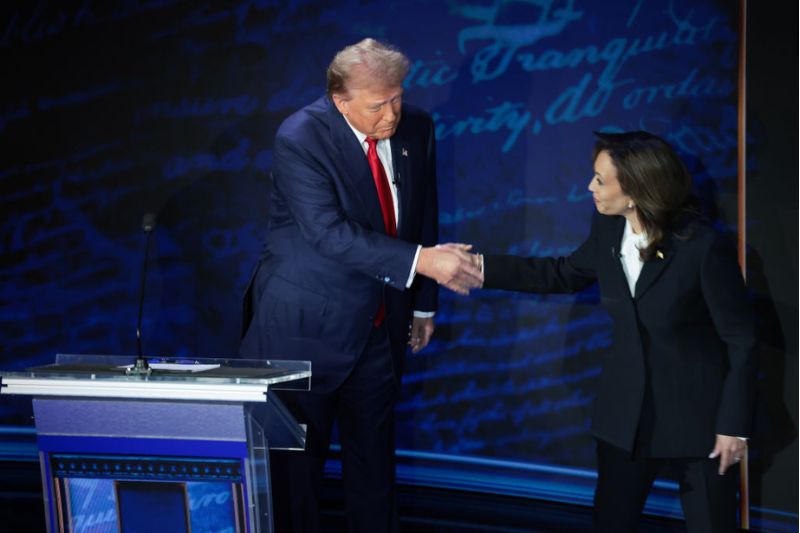Debates between candidates for the US presidency offer a perennial contradiction. Often vapid, rarely substantive, they can be influential. In one of the republic’s closest elections in 1960, Jack F. Kennedy probably secured an extra sliver over his rival, Richard M. Nixon, by virtue of his performances before screen. Suave, composed, with sunny looks, Kennedy’s appeal eclipsed the man with his permanent five o’clock shadow look and sinister cragginess. Therein, the world of appearances could push substance to the side and take centre stage.

On June 27, President Joe Biden found himself in similar trouble. Donald Trump was left bemused by his opponent’s fumbling in a debate that ushered in his decision not to recontest the presidency. Then came the Harris-Trump debate of September 11, which offered an occasion light on policy and heavy on personal venom.
Trump stuck to the usual formula: a refusal to concede defeat in the 2020 election, the problems, and moral failings of immigrants, the value of an aggressive tariff policy. (‘I took in billions and billions of dollars, as you know, from China.) He also reiterated his love of the strong man of politics. Hungary’s Viktor Orbán came in for a special mention, ‘He’s a tough person. Smart. Prime Minister of Hungary.’ Personal attacks featured, including a peculiar remark that Harris was ‘a Marxist’ largely because her father, a professor of economics, was one.
On Ukraine, he claimed the fantastic. He would ‘get the war with Ukraine and Russia ended. If I’m President-Elect, I’ll get it done before even becoming president.’ On the Israel-Palestinian conflict, he was equally fantastic, claiming without foundation that the Biden-Harris administration had a pro-Palestinian bias. (The continued military supply of Israel suggests otherwise.)
Then came the remark about Haitian refugees in Ohio. ‘In Springfield, they’re eating the dogs. The people that came in. They’re eating the cats. They’re eating – they’re eating the pets of the people that live there.’
Harris was primed to attack with set lines of provocation. ‘You will see during the course of his rallies he talks about fictional characters like Hannibal Lecter. He will talk about windmills cause [sic] cancer. And what you will also notice is that people start leaving his rallies early out of exhaustion and boredom.’
The focus was on Trump the petulant man-child. He was having ‘a very difficult time’ accepting the fact that he had been ‘fired by 81 million people.’ World leaders were ‘laughing’ at him. Military leaders called him ‘a disgrace’. Autocrats were ‘rooting for you to be president again’. This method had a stifling effect: a lack of analysis about Washington’s role in prolonging, not to mention stoking, the Ukrainian conflict (Harris calls the war a matter of Ukraine’s ‘righteous defence’ to prevent falling dominos); a refusal to examine the warmonger’s agenda in neoconservative garb; tired references to the US as ‘a leader upholding international rules and norms.’
'A better reading would be the baffling state of affairs that sees a former US president with a chance of regaining the White House despite being a convicted felon, facing multiple further charges, and being the first US president to have been impeached twice.'
On war and conflict, Harris proved to be either deluded or ill-informed. There was ‘as of today … not one member of the United States military who is in [sic] active duty in a combat zone in any war zone around the world, the first time this century.’ This would come as a surprise to any number of US garrisons stationed across the globe, from the Philippines to Syria, not to mention those recently engaged in attacking Houthi positions in Yemen.
On gun control, Harris proved numb, steering clear of any coherent or sustained policy of regulation. She also left room to libel immigrants for illegally crossing the border and fanning the fentanyl crisis and took issue with Trump for not backing a draconian border security bill that was supposedly intended to ‘put more resources to allow us to prosecute transnational criminal organisations for trafficking in guns, drugs, and human beings.’
Trump’s erratic views, his mendacity, is the stuff of inurement. It was, however, clear that the moderators were keener to push the fact-checking fetish with Trump – an exercise always doomed to failure – than they were with Harris. They also resisted follow-up questions to the often hectoring and quavering Vice President.
Rather than seeing the debate in terms of what pitiful morsels were offered to the voters, it would be better to rue how low the bar on such encounters has moved. There was, for instance, no discussion about pressing inequality (the US now ranks 27th out of 82) in terms of global economic mobility. There was little discussion about climate change, with Harris celebrating ‘increased domestic gas production to historical levels.’
A better reading would be the baffling state of affairs that sees a former US president with a chance of regaining the White House despite being a convicted felon, facing multiple further charges, and being the first US president to have been impeached twice.
Another, dark if amusing angle on the whole affair was offered, with acid predictability, by Russia’s Foreign Ministry spokeswoman, Maria Zakharova, who thought a reference to the doomed Titanic was in order: ‘Who do you think won? Why would that matter? The iceberg is 15 minutes away.’
Dr. Binoy Kampmark was a Commonwealth Scholar at Selwyn College, Cambridge. He currently lectures at RMIT University.
Main image: Republican presidential nominee, former U.S. President Donald Trump and Democratic presidential nominee, U.S. Vice President Kamala Harris greet as they debate for the first time during the presidential election campaign at The National Constitution Center on September 10, 2024 in Philadelphia, Pennsylvania. (Photo by Win McNamee/Getty Images)